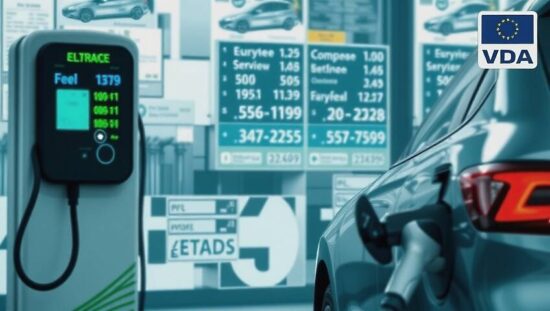Automotive Industry Association Calls for Changes in Public Charging Infrastructure
The German Automotive Industry Association (VDA) is urging changes in the public charging infrastructure in Germany, citing the slow growth of electric mobility. The association has prepared a position paper outlining various measures to achieve this goal, which was mentioned in advance by the Funke Media Group’s newspapers in their Tuesday editions.
“It’s crucial for the mobility transition that the charging of electric vehicles is easy and transparent and above all, offers a price advantage” said VDA President Hildegard Müller to the Funke Media Group. “End-users who rely on public charging infrastructure should not be disadvantaged by high prices and complex tariff models.”
Specifically, the VDA is calling for a reduction in the cost of electricity, which includes network fees, taxes and charges per kilowatt-hour (kWh). “A reduction of the electricity tax to the European minimum rate would be a crucial first step to reduce costs for consumers” Müller added.
Furthermore, the VDA is emphasizing the need for a demand-oriented expansion of the grid and incentives for a better grid utilization to successfully develop the charging infrastructure in the future. The newly formed federal government, consisting of the CDU/CSU and SPD, is currently in the process of negotiating its coalition agreement.
Earlier, the parties had already reached agreements on key points, including price relief for electricity. According to the coalition agreement, the plan is to reduce the electricity tax to the European minimum rate and halve the transmission network fees. In addition to savings on charging prices, the VDA is also advocating for more transparency for consumers when charging their electric vehicles.
According to the position paper, the association is demanding the creation of a comparison portal for charging tariffs, which would offer transparency and choice for consumers. “An independent portal for comparing charging tariffs, similar to gas stations, is a central step to strengthen trust in the charging infrastructure and create transparency” said VDA President Müller.
The creation of a price monitoring agency had recently also been brought up by the German Automobile Club (ADAC). The automotive industry is also calling for changes in stand and blocking fees at public charging points. Specifically, the VDA is demanding the introduction of blocking fees only after the charging process is complete, as well as no fees during nighttime hours in residential areas.
Consumers should not be further burdened by fees that have no clear function, Müller said. Public charging in Germany typically costs between 60 and 90 cents per kWh, which is two to three times more than at home. There is also a significant price difference within the public charging infrastructure, ranging from around 30 cents per kWh at supermarkets to nearly 90 cents.
In addition, consumers often need multiple charging contracts to take advantage of favorable tariffs. VDA President Müller spoke out for solutions that would make the transition to electric mobility easier.
“Currently, it’s too complex – and for the same amount of electricity, sometimes three times as much to pay, is simply not sustainable” she said. In the past year, the number of new registrations for electric vehicles in Germany had experienced a significant decline.





